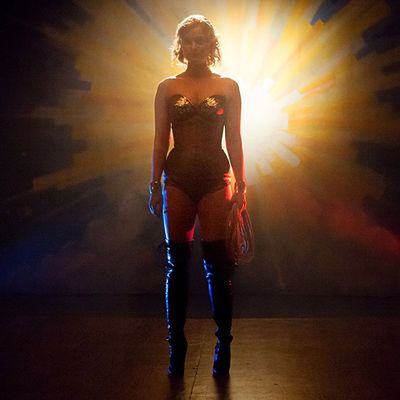
Despite some effort this year by the folks at Warner Bros./DC to smooth things over, it’s barely a secret that Wonder Woman has always had more than a few kinks in her armor. Broad details about creator William Marston’s affinity for dominant women are only a Wikipedia search away, and at a glance they can lend Wonder Woman, even within the plenty freaky world of golden age comics, the retroactive whiff of outsider art. The barely concealed subtext of all those whips and ropes and hogtied men has become a kind of shared snicker for those approaching the subject from anything but an academic standpoint, something maybe even slightly embarrassing, as if it was a failing on the part of Marston to conceal his more niche proclivities. Unlike the neat metaphors for the civil rights movement in titles like X-Men, there’s something messier, and a little more (for lack of a better word) naked about Marston’s female-liberation-via-bondage theorizing.
But Wonder Woman herself clearly came from a place of passion, of an idealism that longed to be unencumbered. (Maybe it’s the idealism — the very thought of a world run by powerful women — that makes us blush for Marston, even more than the sex.) And what Professor Marston and the Wonder Women does, with a wink but refreshingly few snickers, is color in the life-giving fantasy that fueled the creation of the perennially embattled American icon. There’s no bawdy nudge in its telling of the polyamorous relationship between Marston, his wife, Elizabeth, and their lover Olive Byrne. Through writer-director Angela Robinson’s eyes, their relationship — and how they tried and often failed to make it work in the real world — represents nothing short of the essence of creativity. It’s also, for what it’s worth, pretty hot.
The story is framed in that hoariest of biopic devices, the interview, which is the first tipoff that Robinson is going to be pretty earnest in her approach, down to the foreboding cough Marston (Luke Evans) chokes back early on. Unlike other more fortunate biopic subjects, however, Marston’s last interview is not with a devoted fan or ravenous gossip hound about to get their comeuppance, but with Josette Frank (Connie Britton), director of the Child Study Association of America, who wants to get to the bottom of Marston’s insidious plan to poison America’s youth with his BDSM propaganda. Just in case we had any doubt that Marston is under fire, we open with him watching a gleeful crowd of young puritans making a bonfire out of Diana’s racy adventures.
Part of me kind of admires these staunchly traditional stylistic choices, from the treacly original score to several soundtrack choices that are not merely on-the-nose but halfway up the nostril. There’s an importance in making this material approachable, and in making its central trio impossible to refuse. Because, as it soon becomes clear, the relationship between the titular Professor and his superpowered heroine is only a piece of this story. It begins properly in 1928, when Marston is a professor of psychology at Harvard, where he works alongside his wife, Elizabeth (Rebecca Hall). It’s there that he meets Olive (Bella Heathcote), a seemingly unremarkable sorority girl who has applied to be his assistant. The thoroughly modern Elizabeth isn’t blind to her husband’s attraction to Olive, and while she’s far from scandalized (“I’m your wife, not your jailer,” she says drily), she wastes no time bringing Olive into her office to suggest that she not fuck her husband. (Her words, not mine.) And so begins a push and pull that eventually leads to a three-way love affair that would last decades.
Robinson savors this build-up as much as her characters, and the seduction is far more suggestive than explicit; the film is only barely rated R (mostly due to the line mentioned in the last paragraph, as far as I can tell). There are several delightful contraptions of psychological eroticism planted throughout the film, from an early scene where the Marstons witness Olive in the middle of a sorority hazing ritual, to a scene where the three use the couple’s newly invented polygraph machine (they invented that, too) to determine their triangular lust for each other. Robinson builds tension and romance through a keen eye of who is watching whom, and how each are reflected in each other’s eyes. Once the trio start exploring the world of burlesque costume and knot-tying, there’s an even trickier power dynamic to balance, but Robinson makes it look easy. Some might find the Wonder Woman imagery to be laid on a bit thick, but it never comes off as silly; it’s a dream that’s all the more important for its separation from the real world.
It helps that Robinson has such vibrant leads to work with, particularly Hall, who is undeniable as Elizabeth. Hall is one of the best actresses who can play convincingly brilliant characters; in her hands Elizabeth is a genius we want to be best friends with. Heathcote, who was quite good as a covetous model in The Neon Demon, is excellent as well, never not self-possessed in her own seduction. Evans is more passive, but he and Hall have fantastic chemistry; you believe they get off on each other’s brains. Like Diana herself, intelligence and empathy and the pursuit of beauty is what unites this trio; without it, the kink would be an empty signifier. And because of that, Professor Marston is escapist entertainment of the highest, most nourishing order. And all somehow without summoning a single fiery god of War.

